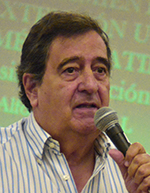To teach is to learn

Oscar Jara (Costa Rica) is Director of CEP Alforja and President of CEAAL
(Consejo de Educación Popular de América Latina y el Caribe).
Contact
oscar.jara_presidencia@ceaal.org
“To teach is not to transfer knowledge but rather to create the conditions for its production or construction.” (Paulo Freire – Pedagogy of Autonomy)
This sentence sums up Paulo Freire’s democratic, critical, creative and challenging vision of the relationship between teaching and learning, totally contrary to the vertical and authoritarian “banking” concept of unidirectional transmission of information by the teacher, to be repeated or memorised by the students.
The educational process is primarily one of building up learning and the capacity to learn. The production of knowledge is an active process in which we access new information, connect it with the information we already have, and develop processes of identification, association, symbolisation, generalisation, reaffirmation or negation between existing knowledge and new information. Thus we produce new knowledge – always actively, and never passively.
That is why, since popular education was introduced, we have conceived of learning as a creative task. Knowledge is constructed and reconstructed, but that is not all. We are made and re-made as people, as subjects capable of thinking, of feeling, of imagining, of projecting, of doing, of transforming. And that is why teaching cannot be reduced to simply dealing with content, but rather entails the carrying out of a whole rich and complex process in which the conditions (and also the provisions) are produced so that we can learn in a critical way. Freire says: “These conditions imply or demand the presence of educators and students who are creators, instigators, restless, rigorously curious, humble and persistent ... the students are transforming themselves into genuine subjects of construction and reconstruction alongside the educator, who is equally subject to the process.”1
This implies that, in order to attempt to teach, as educators we must always have the attitude and willingness to learn. To learn from the situations, the doubts, the concerns that each moment of the process raises for us. Learn from the behaviours, expectations, questions, words and silences of each student with whom we work. To learn from the results – positive or negative – that arise from our pedagogical or didactic initiatives. To learn from the new materials and methodologies that we are exploring, which is demanded by the educative fact that we have the responsibility to give productive guidance.
The greatest challenge for our training as educators is the daily challenge of systematising and learning from our educational practice in order to generate better learning. This challenge never ends, it renews itself daily. And as long as we are so inclined – humble and firm – we will have the possibility of generating the conditions and tendencies that make the construction of critical and creative knowledge and abilities possible, in order to generate learning throughout life.
Note
1 / Freire, P. (1997): Pedagogía de la Autonomía, saberes necesarios para la práctica educativa. México: Siglo XXI. P. 47. [emphasis added]


